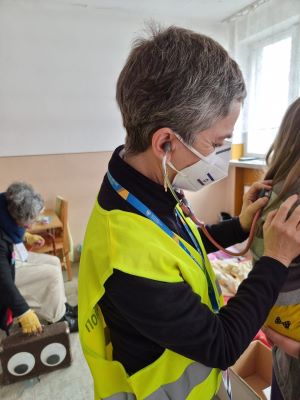

We’ve all seen the pictures from the Polish refugee centers—halls filled end-to-end with mattresses, mothers trying to keep children of all ages occupied while nearly overwhelmed themselves with anxiety and uncertainty, older people grasping their possessions, overcome with being suddenly uprooted, some not for the first time.
Into this confusion steps the staff of the Hadassah Medical Organization Humanitarian Mission, dressed in bright yellow vests that immediately identify them as medical support. Rather than wait for patients to find them in clinics that many refugees don’t even know exist, Hadassah doctors and nurses make their way around the large halls and smaller refugee centers, all the while interacting with the Ukrainians, identifying people in need of medical care, reaching out to those too agitated or afraid to ask for help.

During one of the visits, David “Dush” Barashi, a Hadassah medical clown, noticed an 8-year-old boy, pale and fragile. Carefully and empathetically, Dush approached the boy and his mother and convinced them to come to the clinic for a checkup. The mother even had her son’s medical records with her. No pressing medical problems were found, but notes made at the visit will ensure that the boy receives the appropriate follow-up care in the future.
Dr. Rivka (Rebecca) Brooks, a mission member and newly appointed head of Pediatrics at Hadassah Hospital Mount Scopus, coordinated with the Polish Red Cross to set up a schedule of regular visits to refugee centers, hostels, and even private homes that are hosting refugee families. “It is an honor for any Hadassah staff to be part of this mission,” Dr. Brooks remarks. “All of us pediatricians working at Hadassah Mount Scopus are used to giving the best medical assistance to everybody, should they be Israeli or Palestinian. This is the case also while helping the Ukrainian refugees. We do the very best humanly and professionally possible.”
Speaking more broadly, Dr. Brooks continues, “It is irrelevant where we are. If we can help somehow, even if we have very little we can give, that is enough. We can spread goodness in the world starting with small gestures!”
Main picture caption: Dr. Rivka Brooks consulting a young patient during one of the home visits, while the medical clown David “Dush” Barashi can be seen in the background.
